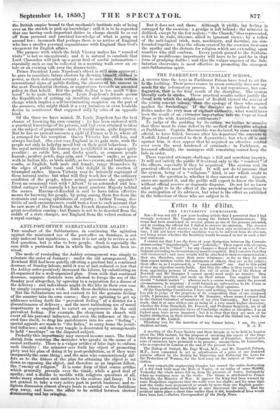ANTI-POST-OFFICE SABBATARIANIS11 AGAIN !
THE conduct of the Sabbatarians, in continuing the agitation against the -minimized use of the post-office on Sandays, is not only indecent but injudicious ; since it is not only to revive a set- tled question, but is also to bore people. -Such is especially the case with a particular form in which the a,gitation has been re- vived.
The mode of rescinding the.Ashley arrangement was simply to reinstate the order of January.: tinder the old arrangement, Mr. Rowland Hill had been quietly effecting a gradual linta continued decrease of Sunday labour, until it was at last reduced so low that the Ashley order positivedy increased the labeur, by substituting an ill-organized for a well-organized plan. Even with that continual decrease, separate districts were allowed to forego the use of the Sunday post altogether, by agreeing to a requisition for a disuse of the delivers'; and individuals might, do the like in their own case by simply expressing a wish. Both those facilities remain open. But the Sabbatarians are not content to let the genuine feeling of the country take its own course ; they are agitating to get up addresses setting forth the " prevalent feeling '• of a district for a discontinuance of dc-livery; and the most unblushing use of moral importunity is employed. to extort an acquiescence in the said prevalent :feeling. For example, the clergyman in church will exert all his personal infLuende, and even the influence of the sa- cred fane itself,:: to drag his parishioners into his own " feeling" ; special appeals are made to "the ladies," to carry home the jesuit- ical influence; and the very temple is,deseerated by arrangements to hold "meetings" on the disputed subject. Probably this importnnity may succeed in some cases. The timid shrink from resisting the minister who speaks in the name of a sacred authority. There is a vulgar artifice of false logic to enforce such timidity : the minister setsforth his object of promoting piety and his plan of doing it post-prohibition, as if they were inseparably the same :thing ; and the man who conseientious1y dif- fers as to the fitness of the plan for attaining the object is set Awn as opposing the object, and therefore as an impious fellow, the "enemy of religion." It is some form of that coarse artifice which generally prevails over the timid; while a good deal of apathy, and a dislike to meddle with religious questions at all, make many abandon such matters to the zealous and fussy. It is not genteel to take a very active part in parish business; and re- ligious discussion almost always leads to scandal • so the fastidious stop away, and leave the affair to be settled between clerical _domineering and lay cringing.
But it does not end there. Although it yields, lay feeling is outraged by the coercion : a grudge is left behind ; the minister is disliked, except by the few zealots ; "the Church," thus represented, is felt to be rude, irksome, allied to ignorant views ; by a reflex of the anti-logical trick, man, machinery, and doctrine, are con- founded together; thus the odium created by the coercion increases the apathy and the distaste for religion which are extending upon numbers who still conform. Every parish gained to the Sabbata- rians by meddlesome importunity will have to be paid for in that form of grudging dislike ; and thus the vulgar urgency of the Sab- batarian observance is most effective in promoting the strongest anti-Sabbatruian spirit.


























 Previous page
Previous page